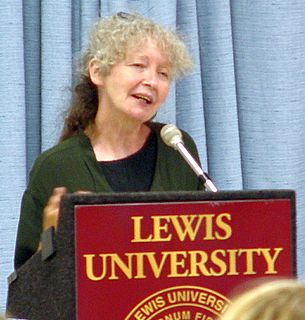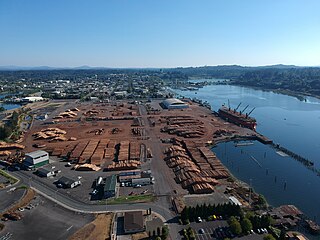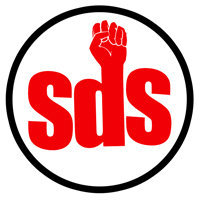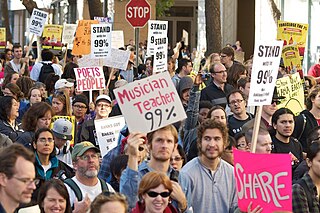Related Research Articles

Significant opposition to the Iraq War occurred worldwide, both before and during the initial 2003 invasion of Iraq by a United States-led coalition, and throughout the subsequent occupation. People and groups opposing the war include the governments of many nations which did not take part in the invasion, and significant sections of the populace in those that did.

Beginning in late 2002, and continuing after the 2003 invasion of Iraq, large-scale protests against the Iraq War were held in many cities worldwide, often coordinated to occur simultaneously around the world. After the biggest series of demonstrations, on February 15, 2003, New York Times writer Patrick Tyler claimed that they showed that there were two superpowers on the planet: the United States and worldwide public opinion.

A protest is a public expression of objection, disapproval or dissent towards an idea or action, typically a political one. Protests can be thought of as acts of cooperation in which numerous people cooperate by attending, and share the potential costs and risks of doing so. Protests can take many different forms, from individual statements to mass demonstrations. Protesters may organize a protest as a way of publicly making their opinions heard in an attempt to influence public opinion or government policy, or they may undertake direct action in an attempt to enact desired changes themselves. Where protests are part of a systematic and peaceful nonviolent campaign to achieve a particular objective, and involve the use of pressure as well as persuasion, they go beyond mere protest and may be better described as cases of civil resistance or nonviolent resistance.
Free speech zones are areas set aside in public places for the purpose of political protesting. The First Amendment to the United States Constitution states that "Congress shall make no law ... abridging ... the right of the people peaceably to assemble, and to petition the Government for a redress of grievances." The existence of free speech zones is based on U.S. court decisions stipulating that the government may reasonably regulate the time, place, and manner – but not content – of expression.

2004 Republican National Convention protest activity includes the broad range of marches, rallies, performances, demonstrations, exhibits, and acts of civil disobedience in New York City to protest the 2004 Republican National Convention and the nomination of President George W. Bush for the 2004 U.S. presidential election.

The Iraqi invasion of Kuwait was an operation conducted by Iraq on 2 August 1990, whereby it invaded the neighboring State of Kuwait, consequently resulting in a seven-month-long Iraqi military occupation of the country. The invasion and Iraq's subsequent refusal to withdraw from Kuwait by a deadline mandated by the United Nations led to a direct military intervention by a United Nations-authorized coalition of forces led by the United States. These events came to be known as the first Gulf War, eventually resulting in the forced expulsion of Iraqi troops from Kuwait and the Iraqis setting 600 Kuwaiti oil wells on fire during their retreat.
On September 24, 2005, many protests against the 2003 invasion of Iraq and the Iraq War took place.

The Basij, Niru-ye Moghāvemat-e Basij, full name Sāzmān-e Basij-e Mostaz'afin, is one of the five forces of the Islamic Revolutionary Guard Corps (IRGC). The force is named Basij; an individual member is called basiji. As of July 2019, Gholamreza Soleimani is the commander of the Basij.

The Bring Them Home Now Tour was a rolling anti-war protest against the Iraq War in the United States, beginning in Crawford, Texas, travelling three routes across the country and culminating in a rally in Washington, D.C. in September 2005. The tour was organized by Gold Star Families for Peace, Iraq Veterans Against the War, Military Families Speak Out, and Veterans For Peace. It was inspired by and featured Cindy Sheehan as a speaker at many rallies. The three tour buses were purchased with donated money.

Frances Crowe was an American peace activist and pacifist from the Pioneer Valley of Western Massachusetts.

Kathy Kelly is an American peace activist, pacifist and author, one of the founding members of Voices in the Wilderness, and, until the campaign closed in 2020, a co-coordinator of Voices for Creative Nonviolence. As part of peace team work in several countries, she has traveled to Iraq twenty-six times, notably remaining in combat zones during the early days of both US–Iraq wars.

Port Militarization Resistance (PMR) is an anti-war movement in the United States. The movement began in May 2006, in Olympia, Washington, but also has chapters in Tacoma, Washington, Grays Harbor, Washington, and the Mid-Atlantic region. Port Militarization Resistance is also the name of the strategy employed by this movement. Adherents of the PMR strategy advocate an end to the Iraq War and the War in Afghanistan to be accomplished through making civilian-owned ports inaccessible to the military, with less emphasis on persuading elected officials to abandon the war. PMR organized high-profile protests at the Port of Olympia and the Port of Tacoma in 2006, 2007, 2008, and 2009.

Adam Charles Kokesh is an American libertarian political activist, radio host, and author. Kokesh was a U.S. 2020 Libertarian presidential candidate running on the single-issue platform of an "orderly dissolution of the federal government."

Eve Tetaz is a retired American public school teacher and peace and justice activist from Washington, DC. Tetaz was arrested 11 times in 2007 for nonviolent civil resistance during protests against the war and occupation of Iraq. She has been arrested approximately a dozen times between 2008 and early 2010.

The September 15, 2007 anti-war protest was a march from the White House to the United States Capitol. It was organized by Veterans for Peace and the ANSWER Coalition. Volunteers were recruited for a civil disobedience action, which included a die-in. Volunteers signed up to take on the name of a soldier or civilian who died because of the war, and lay down around the Peace Monument. In attendance were public figures such as Cindy Sheehan and Ralph Nader. Police arrested more than 190 demonstrators who crossed police lines in front of the Capitol. Chemical spray was used by Capitol Police.

Students for a Democratic Society (SDS) is a United States student organization representing left wing ideals. It takes its name and inspiration from the original SDS of 1960–1969, then the largest radical student organization in US history. The contemporary SDS is a distinct youth and student-led organization with over 120 chapters worldwide.

March 19, 2008, being the fifth anniversary of the United States 2003 invasion of Iraq and in protest and demonstration in opposition to the war in Iraq, anti-war protests were held throughout the world including a series of autonomous actions in the United States' capitol, Washington, D.C., in London, Sydney, Australia, and the Scottish city of Glasgow with the latter three being organized by the UK-based Stop the War Coalition. Actions included demonstrations at government buildings and landmarks, protests at military installations and student-led street blockades. The protests were notable, in part, for mostly replacing mass marches with civil disobedience – including religious-focused protests – and for utilizing new technologies to both coordinate actions and interface with traditional print and broadcast media.

Occupy Oakland refers to a collaboration and series of demonstrations in Oakland, California that started in October 2011. As part of the Occupy movement, protestors have staged occupations, most notably at Frank H. Ogawa Plaza in front of Oakland City Hall.

The militarization of police is the use of military equipment and tactics by law enforcement officers. This includes the use of armored personnel carriers (APCs), assault rifles, submachine guns, flashbang grenades, grenade launchers, sniper rifles, and SWAT teams. The militarization of law enforcement is also associated with intelligence agency–style information gathering aimed at the public and political activists and with a more aggressive style of law enforcement. Criminal justice professor Peter Kraska has defined militarization of police as "the process whereby civilian police increasingly draw from, and pattern themselves around, the tenets of militarism and the military model".

The 2017 May Day protests were a series of protests that took place on May Day over worker and immigrant rights, throughout the United States and around the world. Protests became violent in Olympia, Washington, and Portland, Oregon. Many demonstrators were protesting against the policies of President Donald Trump, specifically those related to immigration.
References
- ↑ "Remarks to City Council" Archived 2006-10-09 at the Wayback Machine , Carrie Lybecker, 6 June 2006
- ↑ "War Activists Plan New Round of Port Protests" [ permanent dead link ], Christian Hill, The Olympian, 26 February 2007
- ↑ "Port Militarization Resistance: We Must Act Locally and Directly To Stop the US Occupation of Iraq" Archived 2007-11-14 at the Wayback Machine , Molly Gibbs, Works In Progress, March 2007
- ↑ "PMR Press Release #4" Archived 2008-01-15 at the Wayback Machine , Port Militarization Resistance, 5 March 2007
- ↑ "War Protesters Move from Port to Downtown, City Hall" Archived 2008-01-15 at the Wayback Machine , Tacoma Daily Index, 7 March 2007
- ↑ "Olympia Residents Won’t Be Charged In Tacoma Protest, Prosecutor Says" Archived 2008-01-15 at the Wayback Machine , Christian Hill, The Olympian, 7 March 2007
- 1 2 "Film Is Not a Crime", Joseph La Sac, YouTube, 7 March 2007
- 1 2 "PMR Press Release" Archived 2008-01-15 at the Wayback Machine , Port Militarization Resistance, 10 March 2007
- ↑ "Give Peace A Chance---Tacoma Police Riot", Joseph La Sac, YouTube, 10 March 2007
- ↑ "Port of Tacoma Police Riot -- Camera #2", Joseph La Sac, YouTube, 10 March 2007
- 1 2 3 "Port of Tacoma: Eleven Days of Resistance" Archived 2007-11-13 at the Wayback Machine , Wally Cuddeford, Works In Progress, April 2007
- ↑ "Tacoma SDS Interviews Tacoma PD", Joseph La Sac, YouTube, 13 March 2007
- ↑ "Peaceful Protesters Arrested at the Port Of Tacoma 3-11-07", 143tbone, YouTube, 12 March 2007
- ↑ "Five arrested for refusing to leave during overnight protest at port" Archived 2008-01-17 at the Wayback Machine , Stacey Mulick, Tacoma News Tribune, 13 March 2007
- ↑ "Port of Tacoma 3-12-07 #2", Rob Richards, YouTube, 15 March 2007
- 1 2 3 "Port of Tacoma Anti-War Protesters Unbowed", Amy Rolph, Seattle Post-Intelligencer, 15 March 2007
- ↑ "Mourn for Iraq at the Port Of Tacoma", Port Militarization Resistance, Portland IndyMedia, 14 March 2007
- ↑ "Anti-war protests cost Tacoma $500,000", Seattle Post-Intelligencer, 2 April 2007
- ↑ "Police Conduct At Port Will Get Citizen Review" Archived 2008-01-15 at the Wayback Machine , Kris Sherman, Tacoma News Tribune, 1 April 2007
- ↑ "First Successful Convictions in a Port Protest-Related Case Since Inception of PMR as a Movement", Phan Nguyen, United for Peace of Pierce County, 1 February 2008
- ↑ "The Newest Member of the Anarchist Lawyers Guild of Olympia", Wally Cuddeford, LiveJournal, 29 February 2008
- ↑ "Film Is Not A Crime --- King5 Interview", KING 5, YouTube, 10 March 2007
- ↑ "Police Investigate Run-In with Videographer" Archived 2008-01-15 at the Wayback Machine , Adam Lynn, Tacoma News Tribune, 9 March 2007